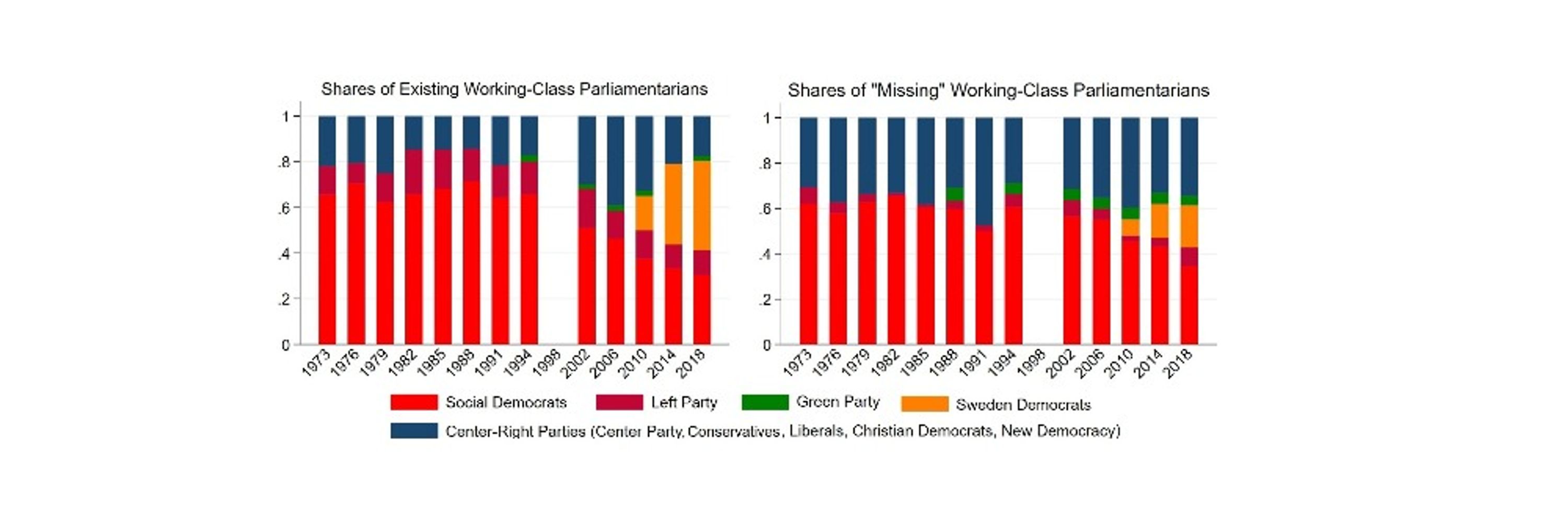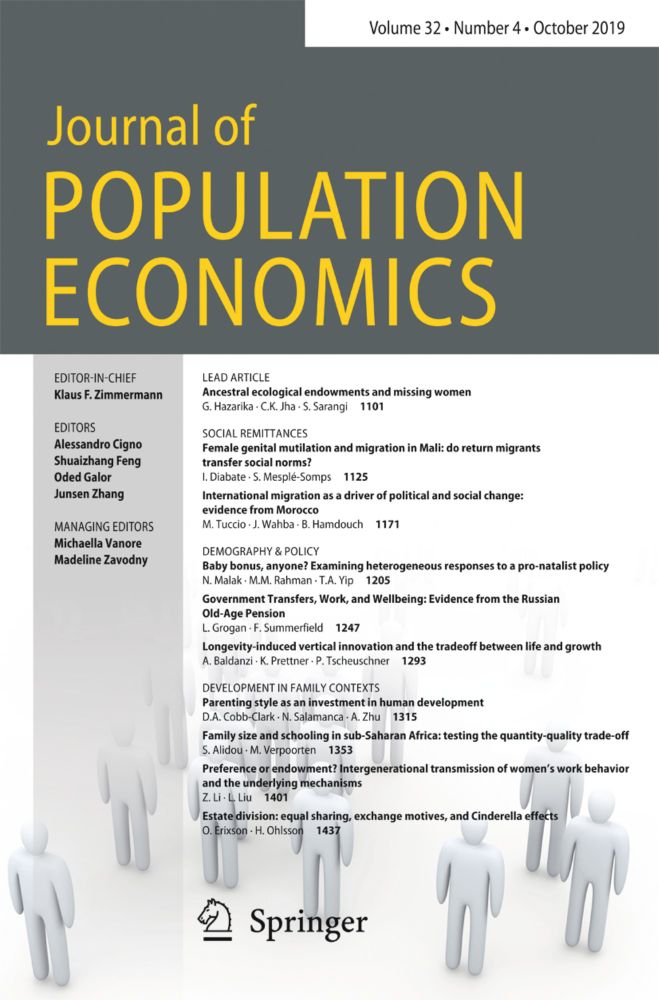
Johanna Rickne
@johannarickne.bsky.social
Professor of Economics
They now say that we submitted in the wrong way, namely by emailing the editor (Zimmerman), which another co-editor told us to do. Nowhere did let us know that we should have submitted in the formal submission system instead. Either way, we are doing so with the new extended replication.
May 13, 2025 at 6:59 AM
They now say that we submitted in the wrong way, namely by emailing the editor (Zimmerman), which another co-editor told us to do. Nowhere did let us know that we should have submitted in the formal submission system instead. Either way, we are doing so with the new extended replication.
10/ Please help share our extended replication to correct the record on this misleading policy evaluation!
Full replication text here: www.econstor.eu/handle/10419...
Full replication text here: www.econstor.eu/handle/10419...
Re-Analysis of Ciacci, R. (2024). Banning the purchase of sex increases cases of rape: evidence from Sweden.
EconStor is a publication server for scholarly economic literature, provided as a non-commercial public service by the ZBW.
www.econstor.eu
May 9, 2025 at 9:29 AM
10/ Please help share our extended replication to correct the record on this misleading policy evaluation!
Full replication text here: www.econstor.eu/handle/10419...
Full replication text here: www.econstor.eu/handle/10419...
9/ Based on our initial and extended replications, we wonder: how can the editor still trust the results of this paper? If this case does not meet the criteria for retraction, what does?
May 9, 2025 at 9:29 AM
9/ Based on our initial and extended replications, we wonder: how can the editor still trust the results of this paper? If this case does not meet the criteria for retraction, what does?
8/ Shockingly to us, most treatment effects are produced by implementing methods in the code that differ from those described in the paper. This practice seems super problematic because it will mislead reviewers and editors who expect the two to align.
May 9, 2025 at 9:29 AM
8/ Shockingly to us, most treatment effects are produced by implementing methods in the code that differ from those described in the paper. This practice seems super problematic because it will mislead reviewers and editors who expect the two to align.
7/ A series of errors create an illusion of statistically significant treatment effects of similar size in the five strategies. Examples include changing/adding/removing variables in regressions, using incorrect bandwidths, and changing clustering methods.
May 9, 2025 at 9:29 AM
7/ A series of errors create an illusion of statistically significant treatment effects of similar size in the five strategies. Examples include changing/adding/removing variables in regressions, using incorrect bandwidths, and changing clustering methods.
6/ We now look into not just one but all five identification strategies in the paper. The figure below summarizes these new results.

May 9, 2025 at 9:29 AM
6/ We now look into not just one but all five identification strategies in the paper. The figure below summarizes these new results.
5/ The editor’s comment confirmed the coding error but failed to mention its impact on the paper’s results. The author concluded that the results were “not robust”. The journal did not post our comment, BUT the replication files allowed us to do the replication we wanted to do from the start.
May 9, 2025 at 9:29 AM
5/ The editor’s comment confirmed the coding error but failed to mention its impact on the paper’s results. The author concluded that the results were “not robust”. The journal did not post our comment, BUT the replication files allowed us to do the replication we wanted to do from the start.
4/ Twelve months after contacting the journal, it posted three things. A comment by the editor: doi.org/10.1007/s001...; A response by the author: doi.org/10.1007/s001...; And FINALLY, the (almost) complete replication package.

Comment on “Banning the purchase of sex increases cases of rape: evidence from Sweden” - Journal of Population Economics
Journal of Population Economics -
doi.org
May 9, 2025 at 9:29 AM
4/ Twelve months after contacting the journal, it posted three things. A comment by the editor: doi.org/10.1007/s001...; A response by the author: doi.org/10.1007/s001...; And FINALLY, the (almost) complete replication package.
3/ Examining the methods and code revealed a coding error caused by trying to include fixed effects perfectly collinear with the treatment. Correcting this error showed no effect of the reform on rape. We sent this partial replication to the author and journal.
May 9, 2025 at 9:29 AM
3/ Examining the methods and code revealed a coding error caused by trying to include fixed effects perfectly collinear with the treatment. Correcting this error showed no effect of the reform on rape. We sent this partial replication to the author and journal.
2/ We requested replication files from the author and the journal. After initially refusing to share any replication material, the author shared a partial do-file once we had collected the data ourselves and were not able to run the main regression described in the paper.
May 9, 2025 at 9:29 AM
2/ We requested replication files from the author and the journal. After initially refusing to share any replication material, the author shared a partial do-file once we had collected the data ourselves and were not able to run the main regression described in the paper.
1/ The paper claimed that the reform caused a jump in rape by 50–60 percent. This seemed hard to reconcile with the flat time trend in reported rapes around the time of the reform.

May 9, 2025 at 9:29 AM
1/ The paper claimed that the reform caused a jump in rape by 50–60 percent. This seemed hard to reconcile with the flat time trend in reported rapes around the time of the reform.
See our Open-Access paper in @electoralstudies.bsky.social for more information: www.sciencedirect.com/science/arti...
Please help share with colleagues or students who might find this resource useful! 🌷🌷🌷
Please help share with colleagues or students who might find this resource useful! 🌷🌷🌷
www.sciencedirect.com
April 16, 2025 at 2:13 PM
See our Open-Access paper in @electoralstudies.bsky.social for more information: www.sciencedirect.com/science/arti...
Please help share with colleagues or students who might find this resource useful! 🌷🌷🌷
Please help share with colleagues or students who might find this resource useful! 🌷🌷🌷
The database is now available on Dataverse doi.org/10.7910/DVN/...
We follow the official method of the Swedish government to code party families. The database includes the raw data from the statistical reports so that users can study more fine-grained local variation. 6/
We follow the official method of the Swedish government to code party families. The database includes the raw data from the statistical reports so that users can study more fine-grained local variation. 6/
doi.org
April 16, 2025 at 2:13 PM
The database is now available on Dataverse doi.org/10.7910/DVN/...
We follow the official method of the Swedish government to code party families. The database includes the raw data from the statistical reports so that users can study more fine-grained local variation. 6/
We follow the official method of the Swedish government to code party families. The database includes the raw data from the statistical reports so that users can study more fine-grained local variation. 6/
A geographic id-code tracks territories over time. Two large mergers reduced the number of municipalities from over 2,500 to 290. This code also allows matching our political data with other historical Swedish datasets on economy, demography, and social movements. 5/
April 16, 2025 at 2:13 PM
A geographic id-code tracks territories over time. Two large mergers reduced the number of municipalities from over 2,500 to 290. This code also allows matching our political data with other historical Swedish datasets on economy, demography, and social movements. 5/
The data lets researchers explore long-term trends in political representation, including how women gained ground in local politics well before gender quotas. Here's a figure showing striking local variation in women’s representation. 4/

April 16, 2025 at 2:13 PM
The data lets researchers explore long-term trends in political representation, including how women gained ground in local politics well before gender quotas. Here's a figure showing striking local variation in women’s representation. 4/
This is the first database of its kind in Sweden with consistent party-family classifications, gender breakdowns, and full historical continuity from the early days of democracy to the present. So what can you use it for? 3/
April 16, 2025 at 2:13 PM
This is the first database of its kind in Sweden with consistent party-family classifications, gender breakdowns, and full historical continuity from the early days of democracy to the present. So what can you use it for? 3/
Swedish local councils historically submitted detailed election statistics to the national government. By hand-coding these archival forms, we recovered gender-by-party family data for each elected council across 29 election waves. 2/
April 16, 2025 at 2:13 PM
Swedish local councils historically submitted detailed election statistics to the national government. By hand-coding these archival forms, we recovered gender-by-party family data for each elected council across 29 election waves. 2/

